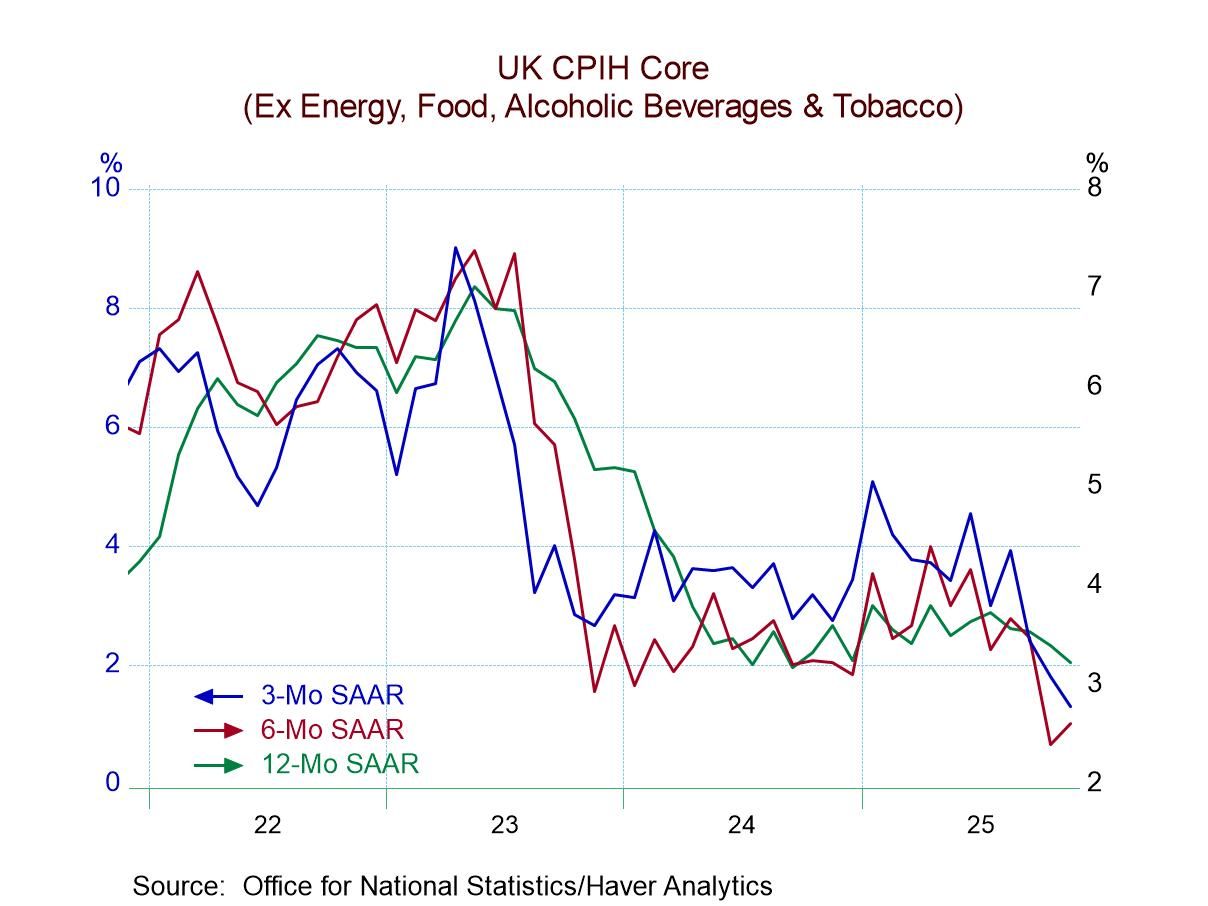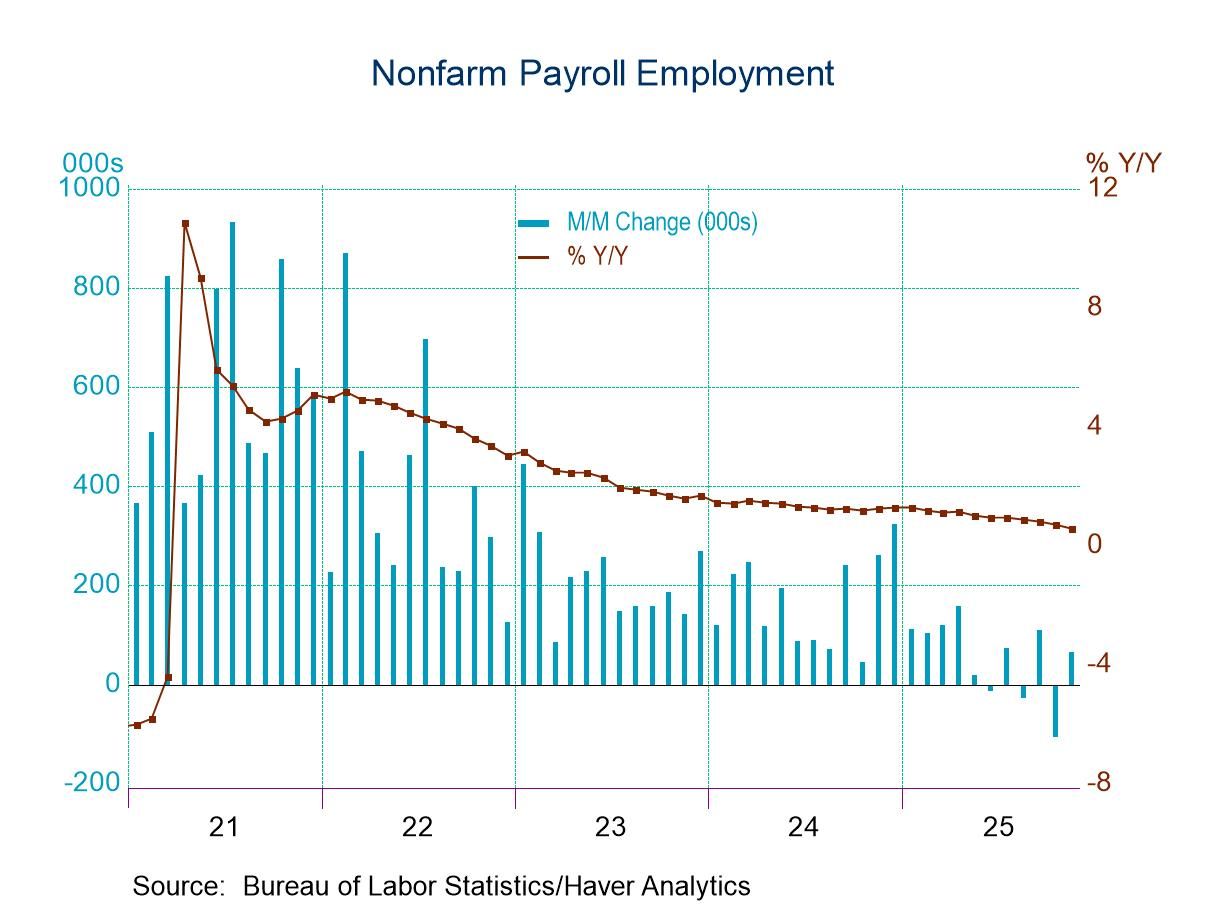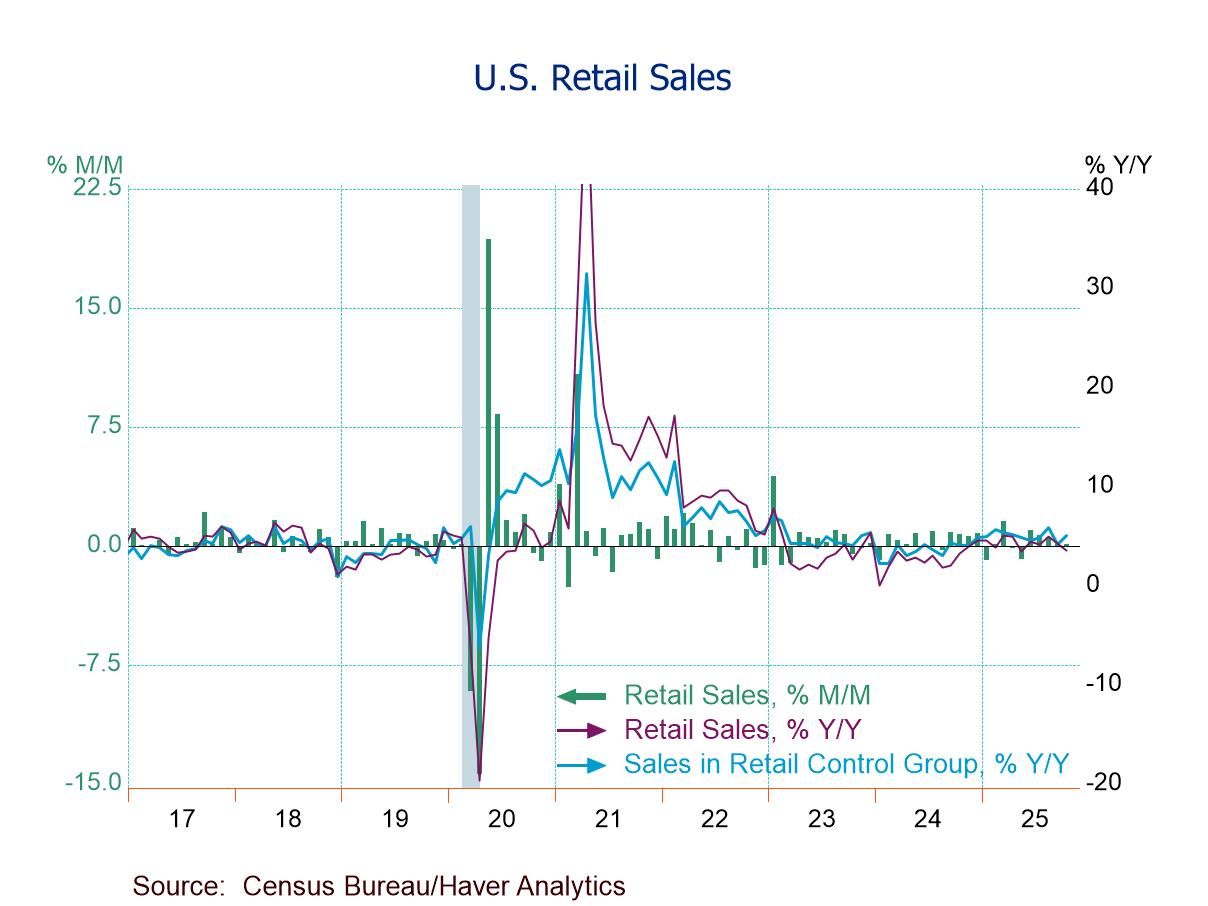 Global| Sep 29 2008
Global| Sep 29 2008U.S. Income Recovered, Spending Was Unchanged
by:Tom Moeller
|in:Economy in Brief
Summary
Nominal personal income recovered 0.5% during August. The increase followed a revised July decline of 0.6% after two months of gains boosted by $90B of government tax rebate checks. The August increase in personal income exceeded [...]
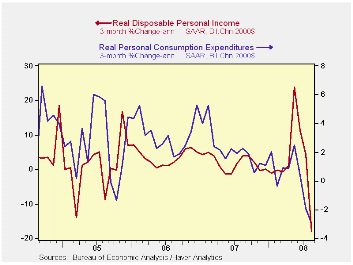
Nominal personal income recovered 0.5% during August. The increase followed a revised July decline of 0.6% after two months of gains boosted by $90B of government tax rebate checks. The August increase in personal income exceeded Consensus expectations for a 0.2% rise.
Disposable personal income fell 0.9% last month after a 0.8% July drop, because net taxes jumped 11.1% (3.3% y/y) in the absence of rebate checks.
Wage & salary income increased 0.4% (4.2% y/y) after a 0.3% rise during July. The annualized three-month growth in wages recovered to 4.0%, it's fastest since December, but that was down from a 5.6% increase during 2007 and a 6.3% 2006 gain. Factory sector wages fell 0.2% (+1.1% y/y) and three-month growth ticked lower to 0.7%. Wages & salaries in the private service-providing industries increased 0.5% (4.5% y/y) while three-month growth totaled 3.8%. That was a deceleration from last year's gain of 6.4%. Wages in the government sector rose 0.3% (5.1% y/y) and three-month growth amounted to 4.6%.
Interest income jumped another 1.2% (-0.1% y/y) following a 7.9% rise during all of 2007. Dividend income increased 0.6% (8.0% y/y) for the fourth consecutive month. Gains have decelerated after rising 12.4% last year and by 21.7% during 2006.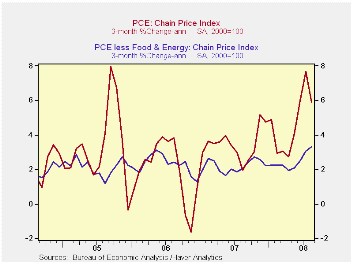
Personal consumption expenditures was unchanged after the downwardly revised 0.1% July uptick. Adjusted for price inflation real spending also was unchanged last month but three-month growth in real spending dropped to negative 2.9% (AR) with real spending on motor vehicles down at a 19.7% rate during the last three months. Furniture spending fell 0.6% last month for the third consecutive monthly decline. Spending on clothing fell 1.2% and at a 13.1% rate during the last three months.
The PCE chain price index was unchanged as energy prices fell. Food prices, which have been notably strong, rose 0.6% (5.9% y/y) and at an 8.9% rate over the last three months. The core PCE price index increased a modest 0.2% and matched Consensus expectations. Three-month growth, however, rose to 3.3%. That was it's fastest rate of increase since late 2001. Apparel prices also were firm and posted a 0.7% (1.3% y/y) increase after the 2.2% rate of deflation reached this past March. Services prices rose 0.2% (3.8% y/y) as transportation costs rose 0.4% (5.5% y/y).
The personal savings rate halved to 1.0% from 1.9% in July, though that was up from a 0.5% saving rate last year.
The figures noted above are available in the Haver USECON and in the USNA databases.
Today's announcement by Fed Chairman Ben S. Bernanke can be found here.
| Disposition of Personal Income (%) | August | July | Y/Y | 2007 | 2006 | 2005 |
|---|---|---|---|---|---|---|
| Personal Income | 0.5 | -0.6 | 4.6 | 6.1 | 7.1 | 5.6 |
| Disposable Personal Income | -0.9 | -0.8 | 4.8 | 5.5 | 6.4 | 4.4 |
| Personal Consumption | 0.0 | 0.1 | 4.6 | 5.5 | 5.9 | 6.2 |
| Saving Rate | 1.0 | 1.9 | 0.4 (Aug. '07) | 0.5 | 0.7 | 0.3 |
| PCE Chain Price Index | 0.0 | 0.6 | 4.5 | 2.6 | 2.8 | 2.9 |
| Less food & energy | 0.2 | 0.3 | 2.6 | 2.2 | 2.3 | 2.1 |
by Louise Curley September 29, 2008
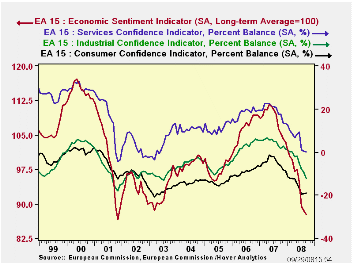
The Euro Area's Economic Sentiment Indicator fell another 0.8 points in September, continuing a virtually uninterrupted decline since May 2007. The index now stands at 87.7 compared to the long-term average of 100. The indicator, together with its three major components, Industrial, Consumer and Service Confidence measures, whose weights account for 90% of the indicator, are shown in the first chart. The components are measured in terms of percent balances.
Sentiment in the service sector has generally been more positive than that in the consumer and industrial sectors, but now even this indicator is barely positive at a balance of 0.2% in September. There was an insignificant increase of 0.3 points in September in the consumer indicator, which did little to reduce its short fall from last year. The indicator is still 17.3 points below September 2007. There was a substantial decline of 2.8 points in the Industrial confidence indicator in September. That indicator is now 14.7 points below September, 2007.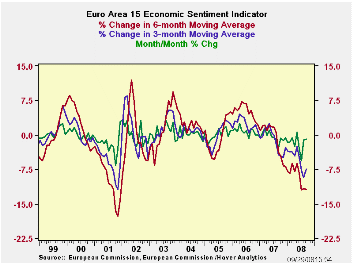
Because of the volatility in the monthly sentiment indicator it is not a particularly good predictor of short-term economic activity. Three or six month moving averages smooth out some of the volatility and are therefore somewhat better predictors of the trend of activity. The second chart compares the month to month change in the sentiment indicator with the month to month changes in the three and six months moving averages. The longer term averages are clearly pointing to lower activity.
| EURO AREA | Sep 08 | Aug 08 | Sep 07 | M/M % chg | Y/Y % chg | 2007 | 2006 | 2005 |
|---|---|---|---|---|---|---|---|---|
| Economic Sentiment Indicator (Long Term Average =100) | 87.7 | 88.5 | 103.4 | -0.90 | -17.50 | 108.4 | 106.3 | 97.4 |
| Industrial Confidence (% balance) | -12.1 | -9.3 | 2.6 | -2.8 | -14.7 | 4.4 | 2.2 | -7.2 |
| Consumer Confidence | -18.9 | -19.2 | -5.7 | 0.3 | -13.2 | -4.9 | -9.1 | -13.9 |
| Service Confidence | 0.2 | 0.6 | 13.6 | -0.4 | -17.3 | 19.3 | 18.0 | 11.1 |
Tom Moeller
AuthorMore in Author Profile »Prior to joining Haver Analytics in 2000, Mr. Moeller worked as the Economist at Chancellor Capital Management from 1985 to 1999. There, he developed comprehensive economic forecasts and interpreted economic data for equity and fixed income portfolio managers. Also at Chancellor, Mr. Moeller worked as an equity analyst and was responsible for researching and rating companies in the economically sensitive automobile and housing industries for investment in Chancellor’s equity portfolio. Prior to joining Chancellor, Mr. Moeller was an Economist at Citibank from 1979 to 1984. He also analyzed pricing behavior in the metals industry for the Council on Wage and Price Stability in Washington, D.C. In 1999, Mr. Moeller received the award for most accurate forecast from the Forecasters' Club of New York. From 1990 to 1992 he was President of the New York Association for Business Economists. Mr. Moeller earned an M.B.A. in Finance from Fordham University, where he graduated in 1987. He holds a Bachelor of Arts in Economics from George Washington University.




